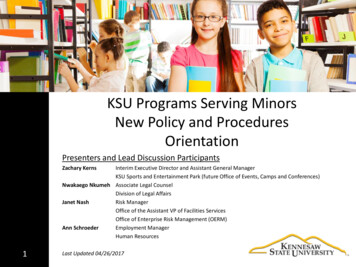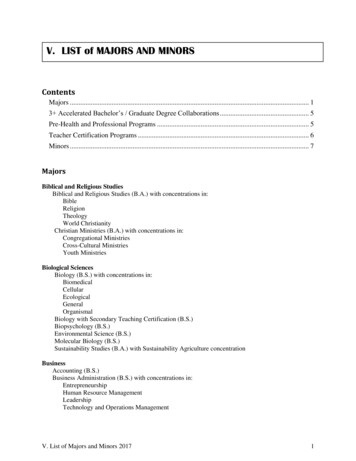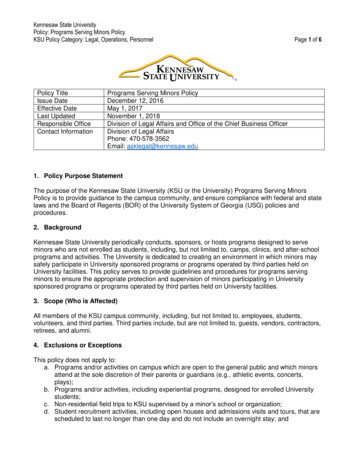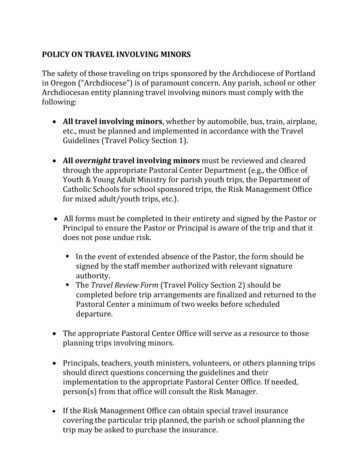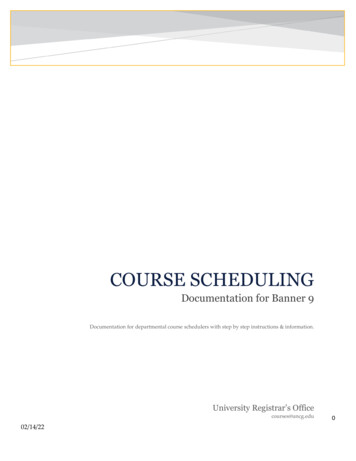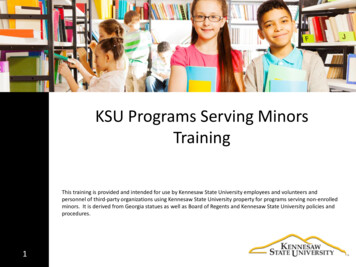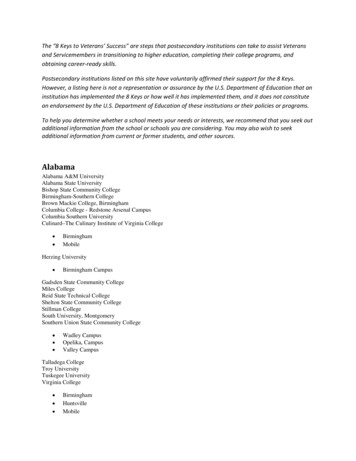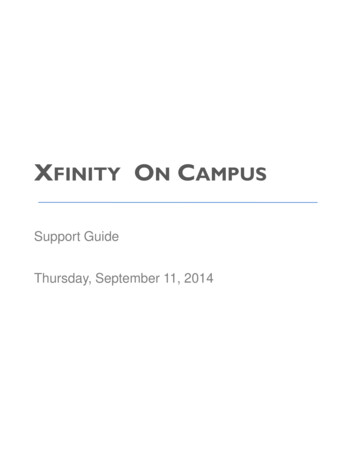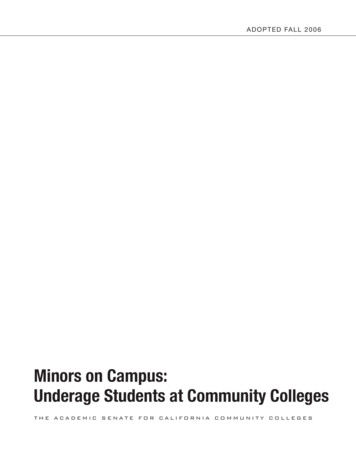
Transcription
A d o p t e d Fa l l 2 0 0 6Minors on Campus:Underage Students at Community CollegesT h e A c a d e m i c S e n at e f o r Ca l i f o r n i a C o m m u n i t y C o l l e g e s
Minors on CampusEducational Policies Committee 2005-2006Mark Wade Lieu, Ohlone College, ChairCathy Crane-McCoy, Long Beach City CollegeGreg Gilbert, Copper Mountain CollegeKarolyn Hanna, Santa Barbara City CollegeAndrea Sibley-Smith, North Orange County CCD/NoncreditBeth Smith, Grossmont CollegeAlice Murillo, Diablo Valley College–CIO Representative
ContentsExecutive Summary. . . . . . . . . . . . . . . . . . . . . . . . . . . . . . . . . . . . . . . . . . . . . . . . . . . . . . . . . . 1Introduction . . . . . . . . . . . . . . . . . . . . . . . . . . . . . . . . . . . . . . . . . . . . . . . . . . . . . . . . . . . . . . 3Laws Concerning Minors in Community Colleges . . . . . . . . . . . . . . . . . . . . . . . . . . . . . . . 6Issues Related to Minors on Community College Campuses. . . . . . . . . . . . . . . . . . . . . . . 8Parental Issues . . . . . . . . . . . . . . . . . . . . . . . . . . . . . . . . . . . . . . . . . . . . . . . . . . . . . . . . . 8Health and Safety Issues. . . . . . . . . . . . . . . . . . . . . . . . . . . . . . . . . . . . . . . . . . . . . . . . . 9Curricular Issues . . . . . . . . . . . . . . . . . . . . . . . . . . . . . . . . . . . . . . . . . . . . . . . . . . . . . . 10The Role of the Local Academic Senate . . . . . . . . . . . . . . . . . . . . . . . . . . . . . . . . . . . . . . . 13Frequently Asked Questions . . . . . . . . . . . . . . . . . . . . . . . . . . . . . . . . . . . . . . . . . . . . . . . . 14Recommendations. . . . . . . . . . . . . . . . . . . . . . . . . . . . . . . . . . . . . . . . . . . . . . . . . . . . . . . . . . 18Sources. . . . . . . . . . . . . . . . . . . . . . . . . . . . . . . . . . . . . . . . . . . . . . . . . . . . . . . . . . . . . . . . . . 19Appendices. . . . . . . . . . . . . . . . . . . . . . . . . . . . . . . . . . . . . . . . . . . . . . . . . . . . . . . . . . . . . . . . 20A. Resources. . . . . . . . . . . . . . . . . . . . . . . . . . . . . . . . . . . . . . . . . . . . . . . . . . . . . . . . . . . . . . 20B. Recommendations from the Minors in Higher Education Task Force. . . . . . . . . . . . 21C. Code and Regulation. . . . . . . . . . . . . . . . . . . . . . . . . . . . . . . . . . . . . . . . . . . . . . . . . . . . . 23
Minors on CampusExecutive SummaryFall 2005 enrollment data show approximately 73,000 students under the age of 18enrolled in California community colleges. Of this number only 19,083 had alreadygraduated from high school, and more than 2,500 were under 14. Given thatstudents under the age of 18 are legally considered minors, community college facultyand staff are often uncertain about their roles and responsibilities for these students.Laws governing the opportunities for minors on community college campuses and theresponsibilities colleges have for them while they are enrolled come from CaliforniaEducation Code, California Penal Code, and California Welfare and Institutions Code.Education Code §§76001 and 76002 authorize colleges to admit minors but also permitscolleges to establish criteria for admission based on age, grade level, and eligibility. PenalCode §§11165 and 11166 include information about child abuse reporting and statesthat faculty and any community college employee who has direct contact with enrolledminors are considered mandated reporters. The Family Educational Rights and PrivacyAct (FERPA) makes it clear that only a student can authorize release of his/her communitycollege records.Issues related to minors on community college campuses can be divided into three areas:parental, health and safety, and curricular issues.While parents are expected to be involved in a child’s decision to attend a communitycollege, FERPA prevents a parent from accessing a student’s grade records without thestudent’s permission. Parents also need to know that admission to a college is not thesame as enrollment in a specific course. Many colleges reserve permission to enroll in acourse to the instructor.
Minors on CampusFaculty are not obligated to act in loco parentis for minors in their classes. Such studentsare expected to take primary responsibility for their own safety and conduct. However,faculty are required by law to report suspected child abuse. Some colleges identify minorson course rosters with a special notation.Admissions offices generally prepare orientation packets for minors (also known as“special admits”) and their parents that make it clear that minors are entering an adultenvironment. Faculty have control of course curriculum, and course syllabi representa contract between the instructor and students in the course. Both parents and minorstudents need to realize that they are bound by the terms of the syllabus in order to earna grade for the class and that parental approval of the course content or assignmentsis not required. Parents also need to know that student communication with counselingfaculty is confidential.The local academic senate should work with relevant college constituencies to createclear policies for the enrollment of minors, including an affirmation that enrollment in aspecific course is dependent on instructor approval. Other areas that should be coveredinclude policies explicitly addressing the participation of minors in international programs,athletics, and performing arts. Faculty should also be involved in the development oforientations for minors and their parents.In addition to recommendations regarding the involvement of faculty in developingboard policies related to the admission and enrollment of minors, this paper includesrecommendations for mandated reporter training regarding child abuse for all faculty andclear notification of faculty when there are minors in their courses. The Academic Senateshould work with the System Office for legal clarification on issues of liability relatedto having minors enrolled on campus and bring the work of the 2003 Minors in HigherEducation Task Force to the Consultation Council for review and consideration of furtheraction.
Minors on CampusIntroductionThe open door policy for the California community colleges has led to access,educational opportunity, and growth for many Californians. While the primarymission of the community colleges is to serve the needs of adults, one group thathas benefited from the excellent educational opportunities at the community colleges inCalifornia are those under 18 years of age and who have not yet achieved a high schooldiploma. Fall 2005 enrollment data for credit and noncredit courses show 791 students10 years of age or younger, 1,965 between the ages of 11 and 13, and 24,853 betweenthe ages of 14 and 16. Of the 46,654 17 year-olds enrolled, only 19,083 had alreadygraduated from high school. (Huffman, 2006) These students are finding their way tocolleges across the state in increasing numbers and for a variety of reasons. Some findthat their high schools lack advanced course level offerings, some are home schooled,and some seek variety and a head start on college work.Given that students under the age of 18 are legally considered minors, communitycollege faculty and staff are often uncertain about their roles and responsibilities for thesestudents. The following examples illustrate some of the safety and educational concernsinvolved. At one California community college, a 12-year-old student was enrolled in anighttime mathematics class. The instructor became ill shortly after the class began, andthe class had to be dismissed early. The youth couldn’t reach her parents and stood alone,outside in the dark, by the parking lot area, where her parents eventually picked her up—three hours later. Faculty have been challenged by parents of minors regarding coursecontent. For a health class, one parent of an adolescent enrolled in the course asked thefaculty member not to use the word “penis” in a discussion of human sexuality. For acomposition class, the parent of a 13-year-old student asked that the faculty member notuse the book Catcher in the Rye because it taught children to disrespect their parents.Faculty also often find that the presence of minors in the classroom changes the dynamicof a class. In a California community college, a 12-year-old student was enrolled in ahistory course. At one point in the semester, what was typically a lively discourse abouthistorical methods of dealing with child birth was hampered by the discomfort of the otherstudents in candidly and graphically discussing labor and birth in front of a child.Given that students under the ageof 18 are legally considered minors,community college faculty and staff areoften uncertain about their roles andresponsibilities for these students.
Minors on CampusIn response to the concerns being expressed in the System and among faculty, theAcademic Senate passed the following resolution in Fall 2001 (F01 13.03):Whereas, K-12 students are eligible for special admission as both part-timeand full-time students of California Community Colleges under Education Code§§48800, 48800.5, 76001, 76001.5, and 76002;Whereas, The provisions of Education Code §§76001.5 and 76002 leave thedetermination of admission to the college president, once parental and K-12permission has been granted; apply the same regulations to all K-12 studentsregardless of grade level; specify that the admissions decision is to be made onlyby the college president; and provide no guidance to assist in the decision;Whereas, The education of minor children involves consideration of content,pedagogy, legal responsibility, and safety provisions different from those involvedin the education of adults, which is the primary focus and concern of communitycolleges; andWhereas, The population of K-12 students enrolled in California communitycolleges is growing and despite, or perhaps because of, the vague language ofcurrent law, K-12 admissions policies vary widely across California communitycollege districts;Resolved, That the Academic Senate define good practices for admission of andservice to minor K-12 students and develop a position paper outlining those goodpractices and making recommendations if necessary to change Title 5 and theCalifornia Education Code on this issue; andResolved, That the Academic Senate request an opinion from the Chancellor’sOffice regarding the legal issues surrounding the admission of minor K-12students.A digest on minors in the California Community College System was brought toConsultation Council in the Fall of 2002 and a task force was convened to discuss howto address the wide range of issues including health and safety, educational policy,fiscal and legal implications. The task force met several times in the Spring of 2003 anddrafted recommendations for discussion by the Consultation Council. However, the workof the group was disrupted by legislative concerns over concurrent enrollment, and therecommendations of the task force were put aside.In the intervening years, the concerns about minors on community college campuseshave remained. The Academic Senate has continued the focus on the issue withdiscussions at plenary sessions and in Rostrum articles. With this paper, the AcademicSenate hopes to provide faculty and staff with a clear understanding of the issuesinvolved in having minors on our campuses.
Minors on CampusFirst, a note about what this paper will NOT cover. Some students who graduate fromtraditional high schools are 16 or 17 years of age when they begin classes and programsat the colleges and are not the focus of this discussion even though they are consideredchildren for the purposes of child abuse reporting. Some minors attend classes withtheir parents or come to work with their parents, and the effects these minors haveon a campus will not be the addressed here, although the impact of these children oncommunity colleges campuses poses its own set of concerns. Often minors are involvedin a college-sponsored program such as summer learning or sports programs offered forchildren of a specific age or grade level. These students along with students in MiddleCollege High Schools (MCHS) are outside the scope of this paper as well.What this paper WILL cover are students under the age of 18, who have not yet attaineda high school diploma and are attending classes on our campuses. The minor that seekshigher-level or alternate courses from those currently available at his/her school will bethe focus for this paper. The paper will focus primarily on issues related to health andsafety, educational policy, and legal implications.The paper begins with a discussion of Education Code, Title 5 Regulation, and legaladvisories issued by the California Community College System Office. The paper thenraises issues related to the presence of minors on campus, which leads to a sectionon the local senate’s role in discussion on campuses and the creation of policies andprocedures that will support the presence of minors on campus while providing campuseswith policies and procedures that should be in place. The next section takes the form of“frequently asked questions” (FAQs) to provide faculty and staff with an easy way to findanswers to common questions. This paper concludes with recommendations for dealingwith issues concerning minors that remain ambiguous. Throughout this paper, the use of the word “parent” implicitly includes legal guardian as well.
Minors on CampusLaws Concerning Minors in Community CollegesEven before minors appear on community college campuses, it is useful to examinelaws governing their opportunities and the responsibilities campuses have for themwhile they are enrolled.Although the community colleges are authorized to provide instruction to anyone whohas obtained a high school diploma or equivalent or is 18 years of age or older (EducationCode §76000), permission for students younger than 18 (who do not have a high schooldiploma) to enroll in community colleges is provided through an interplay of differentsections of Education Code §§76001 and 76002 authorize local boards to enroll “specialadmit” students such as those deemed gifted and high school students in general, and§48800 even allows elementary school children access to community colleges. Under§48800.5, parents are authorized to petition any governing board to allow a pupil to takecourses at a community college.While minors are permitted to enroll in community college courses, §76002 of EducationCode allows colleges and districts to explicitly limit enrollment in any course or programbased on age or grade level. System Office Legal Advisory 05-01 (CCCCO 2005) clarifies:Section 76002(b) clearly authorizes districts to restrict either “admission” or“enrollment” based on age, grade level, or results of an assessment. Sinceenrollment occurs on a course-by-course basis, a district could admit pupils andthen impose such limitations in one course but not in another.The rights and responsibilities of parents with respect to the enrolled minor are alsoexplained in Education Code. Sections 76032 and 87044 stipulate when parents need tobe notified of the actions of a minor, such as in the case of suspension from a class orrelease of a student to a peace officer. Section 48906 also includes provisions for parentalnotification when the minor is released to a peace officer as a victim of suspected childabuse.While minors are permitted to enrollin community college courses, §76002of Education Code allows colleges anddistricts to explicitly limit enrollment inany course or program based on age orgrade level.
Minors on CampusAnother governing body that provides guidance for dealing with all students on acommunity college campus is the Family Educational Rights and Privacy Act (FERPA).While protecting the rights and privacy of students, FERPA also identifies institutionalrights with regard to release of student information and grades.At the postsecondary level, parents have no inherent rights to inspect a student’seducation records. The right to inspect is limited solely to the student.Records may be released to parents only under the following circumstances:1) through the written consent of the student, 2) in compliance with a subpoena,and 3) by submission of evidence that the parents declare the student as adependent on their most recent Federal Income Tax form. An institution is notrequired to disclose information from the student’s education record to theparents of a dependent student. It may, however, exercise its discretion to do so.(AACRAO, 1995)California Penal Code §§11165 and 11166 include information about child abuse reportingrequirements and who is considered a mandated reporter. Faculty are consideredmandated reporters, and any community college employee who has direct contact withminors may also be considered a mandated reporter of child abuse or neglect.
Minors on CampusIssues Related to Minors on CommunityCollege CampusesParental IssuesCentral to this discussion of minors on campus is an understanding of why minorsand their parents want them to enroll in college courses. The majority of minorson campus are concurrently enrolled in a high school and are taking courses ata community college for a variety of reasons. Many are enrolled in community collegecourses because their high schools are not able to offer classes in a particular subject orat a particular level. Some high schools do not offer Advance Placement (AP) courses,so high school students enroll in college courses in order to earn college credit prior tograduation. Some high school students are enrolled in vocational programs articulatedbetween the high school and community college, and these involve enrollment in collegecourses while in high school as part of the agreement.While high school students often make the decision to take college courses on their own,there is a significant parental role in situations where minors younger than high schoolage enroll in community college courses. Some of these younger minors are labeled“gifted” and “talented,” and parents enroll them in college-level courses because of theiradvanced abilities and the need to be challenged in their education. The other majorgroup of younger minors has been home-schooled.While parents of high school students are involved in their children’s decision to enrollin college classes, the level of involvement is generally greater with children youngerthan high-school age. In both situations, parental involvement, while important and to beexpected, can present challenges for a community college.The first significant challenge may come from a parent’s expectation that his/her child isentitled to enroll in a community college course. Colleges retain the right to determineadmission of minors into the college, and board policy should affirm that individualinstructors retain the right to determine enrollment of minors into their courses.Therefore, it is essential for colleges to have clear policies and procedures for theadmission and enrollment of minors that explicitly spell out all the conditions and caveatsfor minors taking college courses.The second significant challenge, especially for parents of minors younger than highschool age, may come from a parent’s expectation of involvement in his/her child’scoursework. Some parents want to accompany their child to class. Others want to be able
Minors on CampusWhile high school students often makethe decision to take college courseson their own, there is a significantparental role in situations where minorsyounger than high school age enroll incommunity college courses.to review course assignments and theirchild’s work for the course. Most want tobe apprised of the child’s progress and thegrades he/she receives for assignmentsand the course. Again, college policiesneed to clarify a parent’s role in the child’scoursework. Most college policies prohibitfamily members from accompanyingstudents to class. For the most part, thispolicy addresses the issue of students bringing children to class; however, the policymay also apply to students bringing their parents to class. FERPA clearly spells outthat the records of a student enrolled in higher education are under the control of thestudent. However, many colleges include on enrollment forms a space where a minor mayauthorize access to college records by a parent.Most colleges require meetings with the parents of minors planning to enroll in collegecourses. At such meetings, an orientation that clarifies these issues and the ones inthe following sections goes a long way to reducing the chance for misunderstanding.In addition, colleges may use such meetings to better evaluate whether or not collegecoursework is appropriate for the minor applicant. While most parents have the bestinterests of their children at heart, faculty and staff have cited problems that enrolledminors have with lack of maturity, inability to work independently, and immaturecognitive development, issues that are not always perceived clearly by the parents.Health and Safety IssuesMany faculty and staff are concerned about a minor’s safety while on campus. Whilecommunity college staff and faculty have some measure of responsibility for thesafety of their students, the degree of responsibility is less than that in K-12 situationssince community college students are adults. Therefore, while faculty and staff takeresponsibility for routing students to exits in the case of fire drills or cautioning studentsabout leaving unattended articles in the library because of recent thefts, faculty and staffdo not take a count of students in fire drills nor do they constantly monitor a student’sbelongings. Community college students are expected to take primary responsibility fortheir own safety and conduct, and this applies to minors on campus as well.Faculty are not always aware that they have minors in their classrooms. A commonobservation among faculty is that the students look younger every year. As a result,faculty often cannot distinguish between an 18-year-old and a 15-year-old since bothlook very young to them. Some colleges provide a notation on course rosters to showwhich students are under the age of 18. This informs a faculty member that child abuse
Minors on Campusreporting requirements come into play.Furthermore, should an emergency occur,the faculty member knows to contact theadmissions office for emergency contactinformation for the minor.Colleges retain the right to determineadmission of minors into the college,and board policy should affirm thatindividual instructors retain the rightto determine enrollment of minors intotheir courses.Beyond the classroom, however, there areother questions of safety; and there are noclear cut answers. Who monitors a minor’sinteraction with other students outside of the classroom? What happens if a minor isstranded at the college because his/her ride is delayed? What happens if an instructorreleases a class earlier than expected? In general, the expectation is that the parentshave discussed with the minor how being on a college campus is different than beingin school. Such a discussion would include what to do in an emergency, common sensesafety precautions, and where to wait if class ends early or a ride is late.Curricular IssuesSince the community college environment addresses the learning needs of adults, thereare some concerns to consider when parents and their children are added to the mix:the possibly controversial content of courses, the maturity level of minor students thatenables them to learn the content and perform as equals to the adults in the classroom,the ability for minors to perform out-of-class assignments that may require travel oradmission to adult environments such as R-rated movies. Communication to the parentsand minor students about the nature of college courses and the adult environment ata college campus is a shared responsibility of the admissions office through documentsprovided to “special admit” or minor students and their parents, the faculty throughthe course syllabi, the board through its policies, and the counseling office throughorientations for parents of “special admit” students.The admissions office at each college has prepared materials to provide to parents of“special admit” students and their parents. These materials probably include regularadmissions forms such as for residency and enrollment. Included should also be adescription of the college environment and considerations for a minor entering a largelyadult environment. In addition, there should be an explanation of orientation options anda general statement about the fact that the minor is establishing a college transcript, adocument that will stay with the individual for the rest of his/her life. Counseling facultyhave an important role to play here. Some colleges, like Diablo Valley College, require thata parent signs the form affirming that information was provided to them that describesthe college environment and some of the obvious consequences of participating in it.10
Minors on CampusA parent signature seems to be a minimal requirement but a useful step in communicatingthe critical aspects of participation of a minor in an environment designed for adults.Faculty will communicate to minors and their parents the nature of the course throughsyllabi. The content for a college course is determined by the faculty of the disciplineand approved through the college Curriculum Committee and other locally determinedprocesses. Faculty establish syllabi for the course, which include the course content orobjectives, assignments, a general guide to the pacing of the course, and informationabout how grades will be determined. Once a student receives the syllabi for the coursefrom the instructor, and the student decides to remain enrolled in the course, the syllabusbecomes the contract between the student and teacher. It is non-negotiable, althoughfaculty retain the authority to make accommodations for students as required by law (asin provisions for more testing time or a notetaker for students with disabilities).Acceptance of the syllabus as a contract is an important consideration for minor studentsand their parents. Where parents may have found other school systems more likely tonegotiate the extent or type of assignments or due dates for these assignments, thisis not likely to be the case on a college campus. Both parents and minor students needto realize that they are bound by the terms of the syllabus in order to earn a grade forthe class, that parental approval of the assignments is not required, and that alternateassignments are offered at the sole discretion of the instructor. It is recommended thatthe parent and minor student carefully review the syllabus for the course to ascertainthe student’s ability to fully participate in the class. An instructor may wish to request asecond parent signature on the course syllabus prior to enrollment of the child to indicatethat the parent understands the contractual nature of the syllabus.The importance of the primacy of the faculty member over course content cannot be overemphasized. Not only the parents of enrolled minors but individual adult students haveobjected to particular course content. It may be obvious that some courses in biology(e.g. human sexuality), religious studies, or in the arts and humanities may be challengingand perceived as inappropriate for minors by their parents; but even apparently noncontroversial courses can be problematic. At the college of one of the Educational PoliciesCommittee members, a third-semester Spanish course was targeted by parents of aminor for its discussion of Frida Kahlo, an individual important to Mexican culture butcontroversial to some because of her sexuality. However, course content is not the onlypotential issue. Class discussions mayenter into areas objectionable to certainCommunity college students areexpected to take primary responsibilityfor their own safety and conduct, andthis applies to minors on campus aswell.individuals. Local senates may want toencourage faculty to include a disclaimeron all syllabi that states that all classesare designed for adults, and minors willbe exposed to adult language and themeswithout warning.11
Minors on CampusCounseling faculty have a potentially difficult role to play. While counselors are requiredby law to report suspected child abuse, other communications with a student, whethera minor or not, are considered confidential. Such communications may involve issuessuch as substance abuse, sexual activity, or pregnancy. Parents should be apprised of theconfidentiality of such information as a part of the orientation to college life.Both parents and minor students need torealize that they are bound by the termsof the syllabus in order to earn a gradefor the class, that parental approval ofthe assignments is not required, and thatalternate assignments are offered at thesole discretion of the instructor.12
Minors on CampusThe Role of the Local Academic SenateThe process of developing policies that address the needs of minors enroll
Mark Wade Lieu, ohlone College, Chair Cathy Crane-McCoy, Long Beach City College Greg Gilbert, Copper Mountain College Karolyn Hanna, santa Barbara City College andrea sibley-smith, north orange County CCD/noncredit Beth smith, Grossmont College alice Murillo, Diablo Valley College-Cio representative
